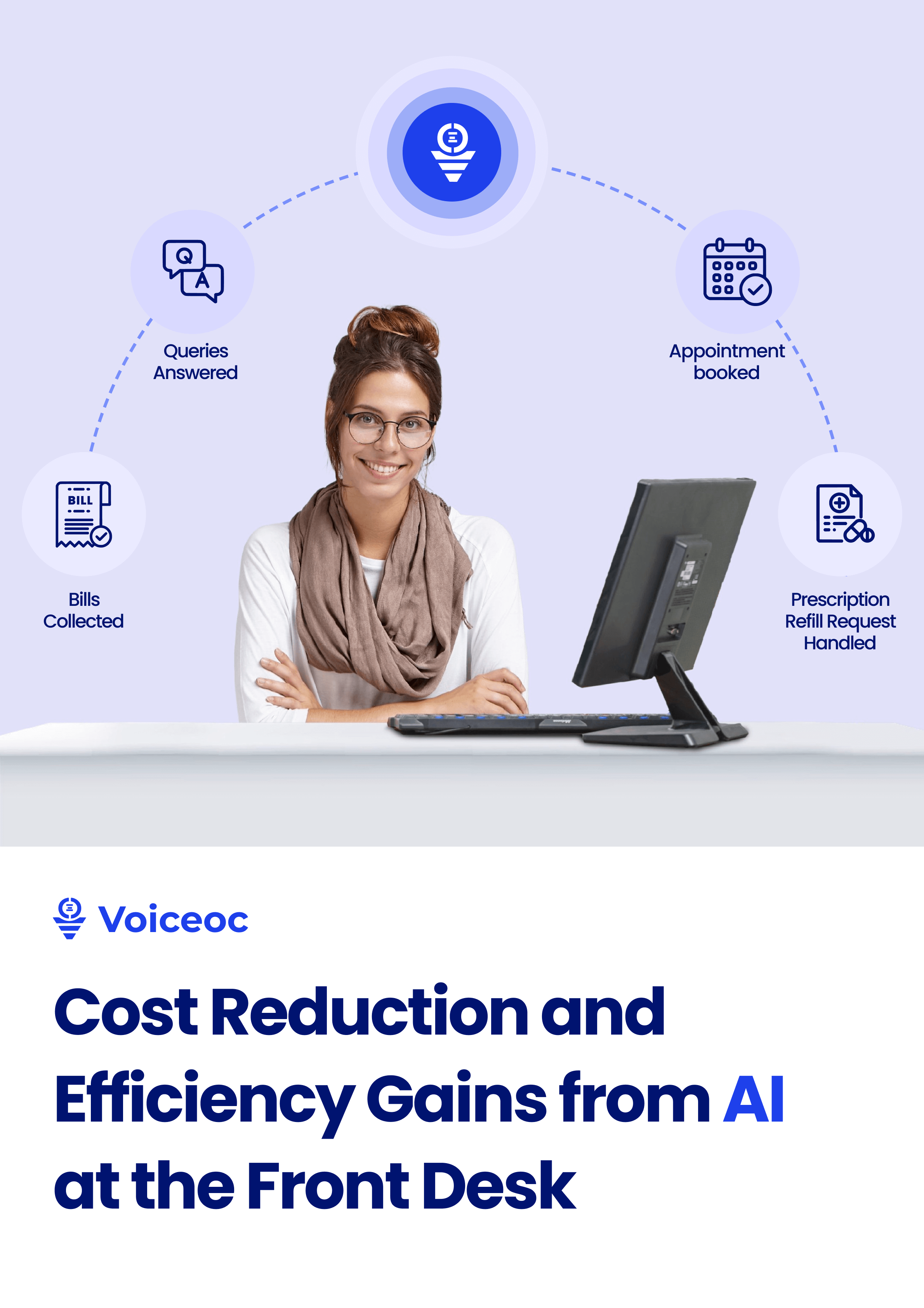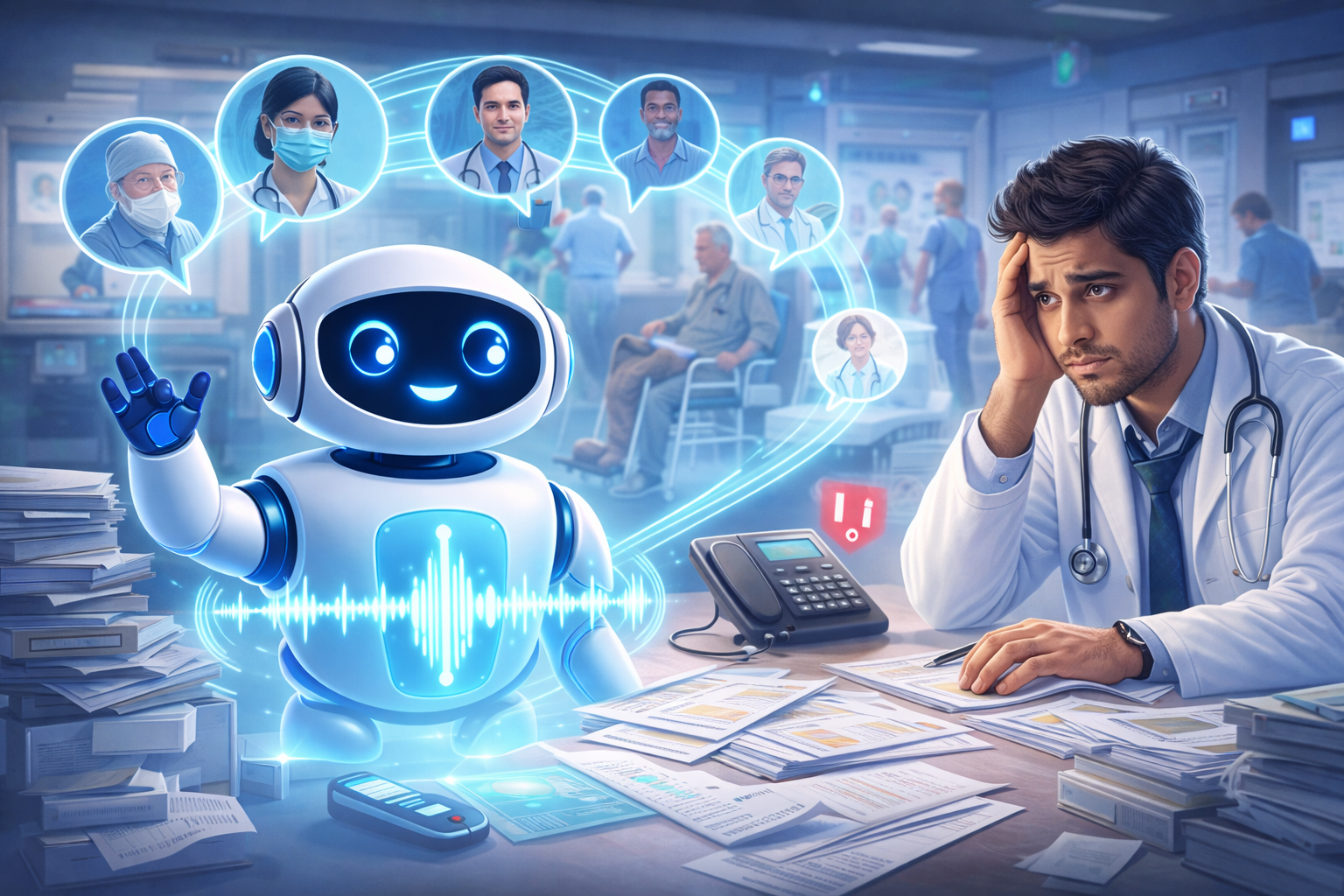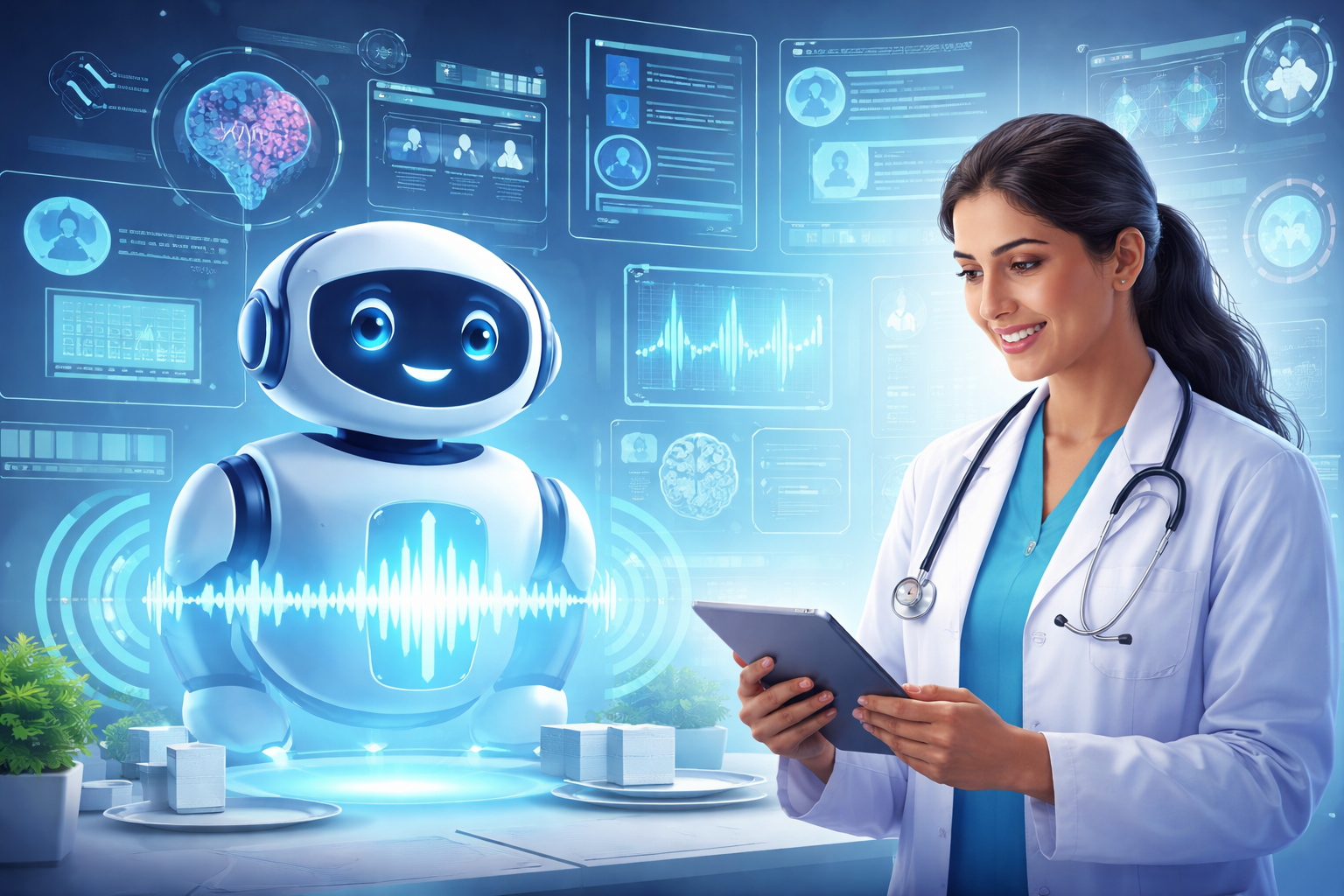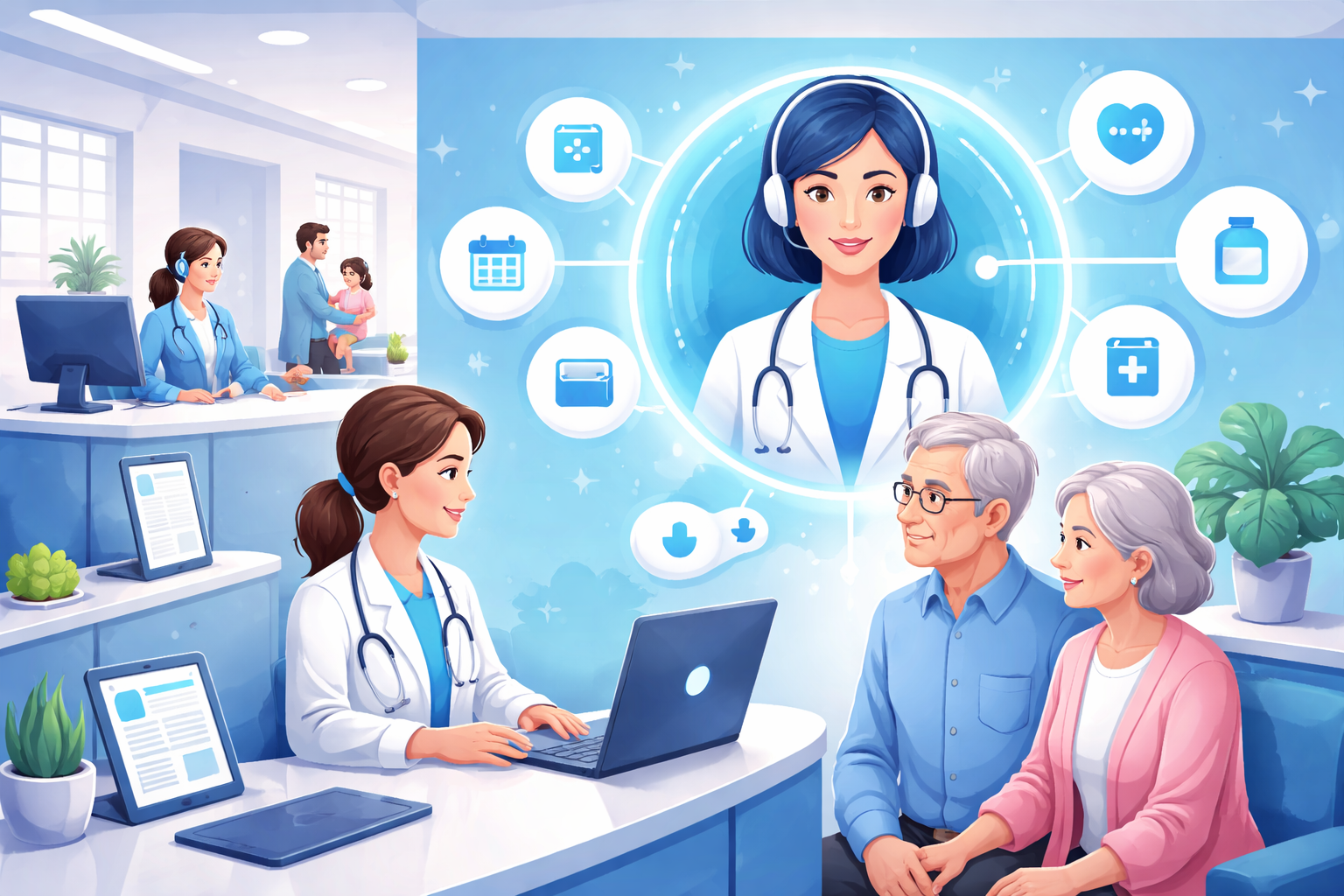Across the globe, medical practices, from solo clinics to multi-specialty hospitals, are facing an unprecedented staffing crisis. Clinicians and administrative staff alike are stretched to their limits, resulting in longer wait times, overwhelmed front desks, and increased burnout. According to recent industry data, the shortage of healthcare workers is projected to reach 10 million by 2030, while nearly 47% of healthcare workers are considering leaving their roles due to stress and burnout.
In this environment, traditional staffing solutions, hiring more receptionists or onboarding temporary workers, can’t keep pace with demand. Instead, medical practices are turning to AI automation that helps bridge workforce gaps, reduce administrative burden, and enhance patient care. Among these solutions, Voiceoc, an AI, medical bot, stands out as a practical tool for healthcare operations.
This blog explores how Voiceoc, as an AI chatbot for medical professionals and a 24/7 AI healthcare receptionist, can help practices navigate staffing shortages effectively.
Understanding the Healthcare Staffing Crisis
Before diving into how Voiceoc helps, it’s important to understand the magnitude of the staffing challenge:
- Global shortage projected: Healthcare workforce deficits worldwide could reach 10 million by 2030.
- Burnout and attrition: Nearly half of healthcare staff are contemplating leaving their roles due to workload pressures.
- Physician shortfalls: The U.S. alone may face a shortage of up to 124,000 physicians by 2034.
These challenges affect every aspect of patient care, from scheduling appointments to answering basic queries, putting immense pressure on limited staff and denting patient satisfaction.
What Is an AI Medical Bot?
An AI medical bot is a digital assistant that uses conversational AI and natural language processing (NLP) to interact with patients and perform tasks usually handled by human staff. These tasks range from scheduling appointments and answering FAQs to collecting patient details and sending reminders.
The Voiceoc AI bot is specifically designed as a healthcare AI receptionist and medical AI chatbot for doctors, offering automation for key front-desk workflows. It works across digital channels, including WhatsApp, website chat, SMS, and phone, to engage with patients through intelligent, human-like conversations.
How Voiceoc Helps with Staffing Shortages?
Here’s a detailed look at how the Voiceoc AI medical bot supports medical practices facing workforce constraints.
1. 24/7 AI Customer Support and Reception
One of the most impactful features of Voiceoc is its around-the-clock availability. Unlike human staff who adhere to office hours, Voiceoc can interact with patients 24/7, ensuring no query goes unanswered, even after hours or on weekends. This capability transforms patient experience and prevents missed opportunities simply because your front desk wasn’t staffed at that moment.
Being a true 24/7 AI healthcare receptionist, Voiceoc handles:
- New inquiries and registration requests
- Appointment scheduling and rescheduling
- Basic clinical information and office details
This constant availability can drastically reduce staff workload while improving patient responsiveness.
2. Automated Appointment Scheduling & Management
Appointment scheduling can consume a large portion of administrative time, especially when staff must handle phone calls, texts, or emails manually. Voiceoc automates this process by checking calendar availability, booking healthcare appointments instantly, and sending confirmations or reminders. This not only frees staff time but also minimizes human error and scheduling conflicts.
With automation, practices often see improved schedule adherence and reduced gaps between patient bookings.
3. Handling FAQs & Routine Patient Queries
Patients frequently ask similar questions, such as clinic hours, accepted insurance plans, preparation instructions for tests, or lab result timelines. Addressing these repetitively can be draining for human staff.
Voiceoc works as a medical AI chatbot for doctors and clinics, answering routine queries instantly through NLP-powered conversations. By automating up to 90–95% of queries, Voiceoc significantly reduces repetitive tasks for your team.
4. Omnichannel Patient Engagement
Today’s patients interact with practices through many digital touchpoints, websites, WhatsApp, SMS, and social media. Voiceoc supports omnichannel engagement, interacting with patients wherever they prefer. This improves accessibility and ensures consistent communication across platforms without requiring extra human staffing.
5. Post-Appointment Follow-Up and Feedback Collection
Maintaining patient engagement doesn’t end at the appointment. Follow-ups, post-visit reminders, and feedback are crucial for patient satisfaction and continuity of care.
Voiceoc can automate:
- Post-visit check-ins
- Treatment reminders
- Real-time feedback collection
This extended interaction further reduces administrative tasks and enhances patient loyalty without staff intervention.
6. Multilingual Support
Practices serving diverse populations benefit from Voiceoc’s multilingual capabilities. The AI understands and converses in multiple languages, ensuring that language barriers don’t become another staffing challenge.
Strategic Benefits for Medical Practices
Why should practices invest in solutions like Voiceoc? Beyond addressing shortages, here are the strategic advantages:
- Reduce Administrative Burden
By automating routine tasks, Voiceoc allows human staff to focus on more complex, high-value interactions, like assisting critical cases, managing clinical workflows, and supporting patient care.
Know: Key Strategies to Improve Quality & Reduce Healthcare Costs By 40%
- Improved Patient Satisfaction and Experience
Patients receive immediate responses, seamless engagement across channels, and consistent follow-ups, leading to a smoother experience, positive reviews, and increased loyalty.
- Higher Efficiency and Productivity
AI automation helps practices eliminate bottlenecks and speed up operations. Clinics see reduced wait times, fewer scheduling conflicts, and more efficient front-desk operations.
- Cost Savings and Staff Focus
Hiring full-time receptionists or after-hours support can be costly. In contrast, Voiceoc offers an automated solution that scales based on volume without proportional increases in operating costs. This makes it a cost-effective alternative to expanding headcount.
Real-World Impact: A Case Example
A real medical group implemented Voiceoc to manage rising call volumes and staffing gaps, especially after hours. With AI automation:
- They recovered roughly 100 appointment calls per month
- Saved 9,800 staff minutes over five months
- Ensured that no patient call went unanswered
This case highlights how automation can measurably enhance operational capacity and help staff focus on core clinical duties.
Read Case Study: How 7 Day Dental Stopped Missed Calls & Freed Staff with Voiceoc AI?
Best Practices for Implementing AI Medical Bots
To maximize the benefits of Voiceoc AI medical bot:
1. Start With High-Impact Tasks
Begin automation with tasks that are repetitive but essential, such as appointment booking, FAQs, and reminders, and gradually expand the scope.
2. Maintain a Human-in-the-Loop
While AI handles routine work, ensure complex cases are escalated to human staff promptly. This hybrid approach balances efficiency with empathetic care.
3. Train and Support Staff
Teach your team how to collaborate with AI tools effectively. Voiceoc dashboards and insights can help staff understand automated interactions and intervene where needed.
4. Ensure Compliance and Security
Practice compliance with healthcare privacy standards (like HIPAA) and secure data governance practices to protect patient information.
Conclusion
Staffing shortages are a real and growing concern for medical practices, but they don’t have to compromise patient care or operational quality. By integrating tools like Voiceoc, a leading AI chatbot for medical professionals and a healthcare AI receptionist, practices can automate front-desk operations, engage patients 24/7, reduce workload, and improve overall efficiency.
Instead of viewing automation as a replacement for human staff, it should be seen as a partner that amplifies your practice’s capabilities, enabling clinicians and administrators to focus on what they do best: delivering compassionate, high-quality healthcare.
Frequently Asked Questions
1. How does Voiceoc help medical practices deal with staffing shortages?
Voiceoc automates front-desk and patient communication tasks such as appointment scheduling, FAQs, and follow-ups. As a 24/7 AI healthcare receptionist, it ensures patient inquiries are handled even when staff availability is limited, reducing workload and burnout.
2. Is Voiceoc an AI chatbot designed specifically for medical professionals?
Yes. Voiceoc is an AI chatbot for medical professionals and doctors, built to support clinics and hospitals by managing patient interactions, administrative workflows, and appointment coordination securely and efficiently.
3. Can Voiceoc replace a human medical receptionist?
No. Voiceoc works as an AI receptionist medical solution that supports, not replaces, human staff. It handles routine, repetitive tasks so receptionists and care teams can focus on complex, sensitive, and patient-centric interactions.









































.png)


.svg)
.svg)




















